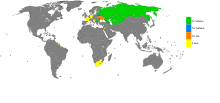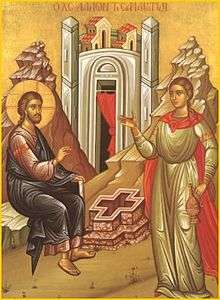Svetlana
Svetlana (Russian, Bulgarian, Serbian Cyrillic: Светлана; Belarusian: Святлана, romanized: Sviatlana; Ukrainian: Світлана, romanized: Svitlana) is a common Orthodox Slavic female name, deriving from the East and South Slavic root svet (Cyrillic: свет), which translates into English as "light", "shining", "luminescent", "pure", "blessed", or "holy", depending upon context similar if not the same as the word Shweta in Sanskrit.[1] The name was coined by Alexander Vostokov and popularized by Vasily Zhukovsky in his eponymous ballad "Svetlana", first published in 1813. The name is also used in Ukraine, Belarus, Slovakia, and Serbia, with a number of occurrences in non-Slavic countries.[2]

 Svetlana is often used in reference to the Samaritan woman at the well in the Biblical Gospel of John. It is the Russian version of the Greek saint name Photini, meaning "enlightened" | |
| Gender | female (feminine) |
|---|---|
| Origin | |
| Word/name | Slavic, Romanian, Lithuanian, Circassian |
| Meaning | "light", "pure" |
| Region of origin | countries that speak Slavic languages |
| Other names | |
| Nickname(s) | Svetka, Sveta, Svetla, Svietla, Svietlanka, Svetulya, Svetochka, Lana, Svetti |
| Related names | Svitlana, Sviatlana, Svjetlana, Świetlana |
In the Russian Orthodox Church Svetlana is used as a Russian translation of Photina (derived from phos (Greek: φως, "light")), a name sometimes ascribed to the Samaritan woman at Jacob's well (the Bible, John 4).
Semantically, similar names to this are Lucia (of Latin origin, meaning "light"), Claire ("light" or "clear" in French, equivalent to Spanish Clara), Roxana (from Old Persian, "little shiny star, light"), and Shweta (Sanskrit, "white, pure").
Variants
The Ukrainian equivalent is Svitlana (Ukrainian: Світлана), the Belarusian, Sviatlana (Belarusian: Святлана), the Polish variant is Świetlana, the Czech Světlana, and the Bosnian, Croatian and Montenegrin variant is Svjetlana (Cyrillic: Свјетлана).
Diminutives
Russian language diminutives include Sveta (Russian: Света, used in Russian-speaking countries) and Lana (the latter is mainly used outside the former USSR).
Sveta also means "saint" in Bulgarian. The Slavic element Svet means "blessed, holy, bright".
Serbian language diminutives of the name are Sveta (Света), and Ceca (Цеца, pronounced Tsetsa).
People
- Svetlana Abrosimova, professional basketball player
- Svetlana Alexievich, journalist, writer, 2015 Nobel laureate in Literature
- Svetlana Alliluyeva, the youngest daughter of Joseph Stalin
- Svetlana Biryukova (born 1991), Russian long jumper
- Svetlana Boiko, Russian fencer
- Svetlana Boginskaya, Soviet Belarusian gymnast
- Svetlana Bolshakova, Belgian triple jump athlete
- Svetla Bozhkova (or Svetlana), Bulgarian discus thrower
- Svetlana Cherkasova, Russian middle distance runner
- Svetlana Chmakova, Russian-born comics artist
- Svetlana Gorshenina, Uzbekistani historian of Central Asia
- Svetlana Ishmouratova, Russian biathlete and soldier
- Svetlana Kapanina, Russian aerobatic pilot
- Svetlana Khodchenkova, Russian actress
- Svetlana Khorkina, Russian gymnast
- Svetlana Koroleva (model), Russian model
- Svetlana Koroleva (water polo), Kazakhstani waterpolo player
- Svetlana Koroleva-Babich, Soviet javelin thrower
- Svetlana Krachevskaya, Soviet Olympic silver medalist in shot put
- Svetlana Kuzina, Russian water polo player
- Svetlana Nikolaevna Kryuchkova, Russian actress
- Svetlana Valentinovna Kryuchkova, Russian volleyball player
- Svetlana Kulikova, Russian ice dancer
- Svetlana Kuznetsova, Russian tennis player
- Svetlana Loboda, Ukrainian singer
- Svetlana Lunkina, Russian ballet dancer
- Svetlana Masterkova, Russian middle distance runner
- Svetlana Matveeva, Russian chess player
- Svitlana Maziy, Ukrainian rower
- Svetlana Medvedeva, wife of Russian Prime Minister Dmitry Anatolyevich Medvedev
- Svetlana Melnikova, Soviet discus thrower and shotputter
- Svetlana Moskalets, Russian heptathlete
- Svetlana Nageykina, Soviet/Russian cross-country skier
- Svetlana Pankratova, world record-holder for longest female legs
- Svetlana Paramygina, Soviet Belarusian biathlete
- Svetlana Petcherskaia, Russian biathlete
- Svetlana Pletneva, Russian archeologist and historian
- Svetlana Ražnatović, Serbian pop-folk singer from Serbia
- Svetlana Roudenko, Russian-American mathematician
- Svetlana Savitskaya, Soviet cosmonaut
- Svetlana Smirnova, Soviet and Russian actress
- Svetlana Smirnova (sport shooter), Soviet and Russian sport shooter
- Svetlana Ulmasova, Soviet long-distance runner
- Svetlana Vysokova, Russian speed skater
- Svetlana Zainetdinova, Soviet-Estonian chess player and coach
- Svetlana Zakharova (dancer), principal dancer with the Bolshoï Ballet
- Svetlana Zakharova (athlete), Russian long-distance runner
See also
- Alexander Vostokov
- Shweta, equivalent South Asian name
- Keiko, equivalent Japanese name
References
- Monier-Williams, Monier (1899). A Sanskrit-English dictionary : etymologically and philologically arranged with special reference to cognate Indo-European languages. Oxford: Clarendon Press.
- "Baby Names, Name Meaning, Popularity". BabyCenter.